
At first glance, the town of Roundup in Montana seems like a typical deaf-mate. Founded at the end of the 19th century by ranchers and small industrialists, it survived only from coal, which was mined in local mines and transported by rail. But the coal ran out, the train no longer runs, and the Roundup population has recently dropped below 1800 people. Hundreds of kilometers to the nearest large city, there is really no work.
Time here seems to have stopped. Silhouettes of cowboys painted on boarded up windows. Behind the empty windows are the wheels of the wagons covered with cobwebs and dust. In the form of a sight, there is a loop hanging from the “gallows tree”, which, as the tablet explains, was used to execute three thieves and two unlucky passers-by. There is a lone traffic light on the road, constantly flashing red.
In short, Roundup is the last place that could be mistaken for a center of international electronic commerce. Nevertheless, thousands of packages are now processed every day from Target, Walmart, eBay and many others on their way to Amazon. All thanks to the efforts of a small group of women.
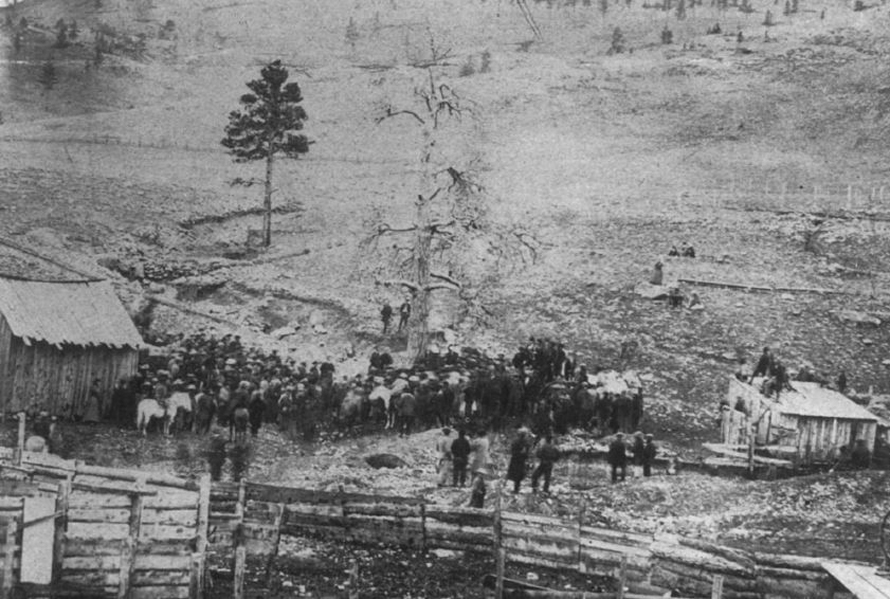
So the inhabitants of the town had fun over a hundred years ago
The geography of Amazon is a mysterious thing. More than 14 million square meters of warehouses, marshalling yards and distribution centers are scattered throughout the country. Mostly in the suburbs and former industrial areas, hidden from the eyes of millions of customers. But even by Amazon standards, Roundup is something new. There is no warehouse, no sorting center. In general, there is nothing that is at least somehow officially connected with Amazon. In fact, Roundup is part of a rapidly growing product preparation industry. With dozens of small businesses that are responsible for repackaging parcels - so that they meet the growing demands of Amazon's automated warehouses.
It all started in 2015. Crystal Graham, 39, worked at a ranch in Roundup, but when her brother died, she went to Amazon to sell his books. Soon she was sucked into the microworld of a popular Internet site. She sold all the books, figured out the interface, and realized that she could buy anything from other retailers, and then sell it here, getting a profit.
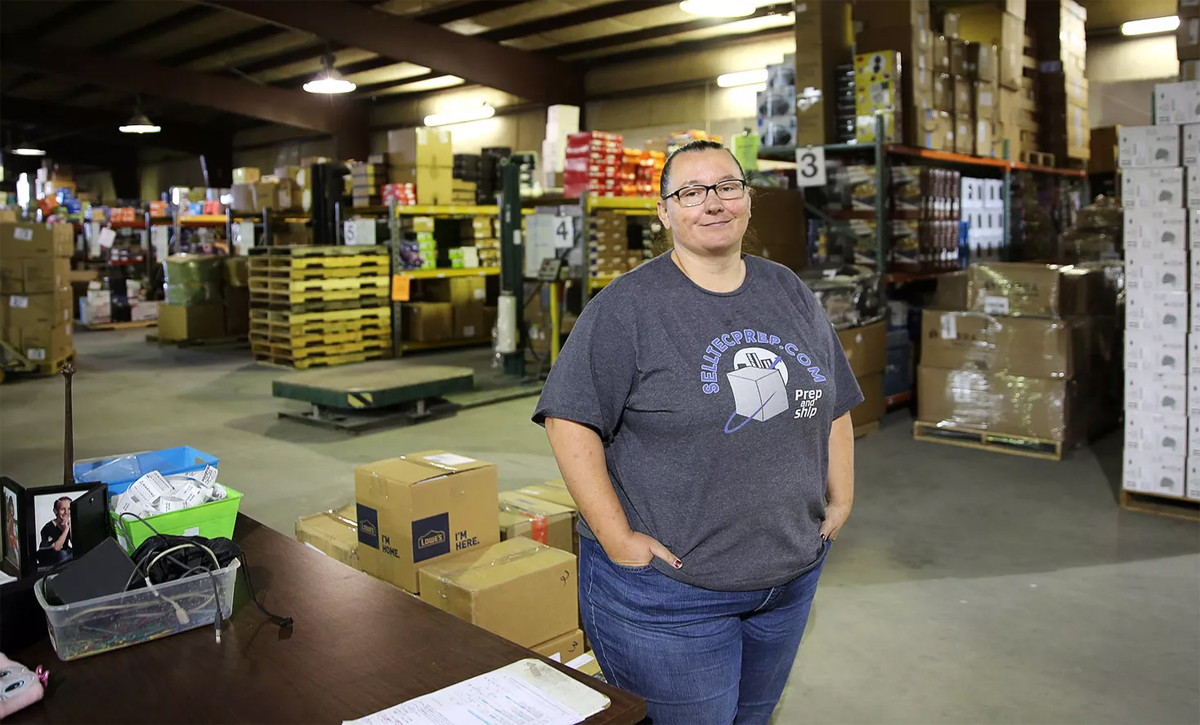
Crystal Graham
This is a fairly standard practice that helps Amazon offer the widest product catalog in the world. In addition, it’s more difficult for brands to refuse to sell on the site because they know that others will do it for them. And competitors are afraid to make big discounts to attract buyers, because they know that resellers will immediately attack them, then to put it at a normal price.
Shopping on Amazon has become a habit of tens of millions of Americans. It’s so simple, so convenient, and the delivery is so fast (and almost always free) that people generally don’t even check other websites. If this is not on Amazon, then this is nowhere. 50% of US online commerce takes place in Bezos’s pocket.
But Amazon only accepts products that are packaged in a specific way. So that they can be processed by an automatic conveyor in the sorting center. Old barcodes and prices should be replaced with new ones, glass should be wrapped in bubble wrap, some boxes should be reduced, others should be increased. As Crystal began to develop her business, she had to deal with this unpacking and repacking more and more often. She began to look for a “preparatory center” for products going to Amazon to do this for her.
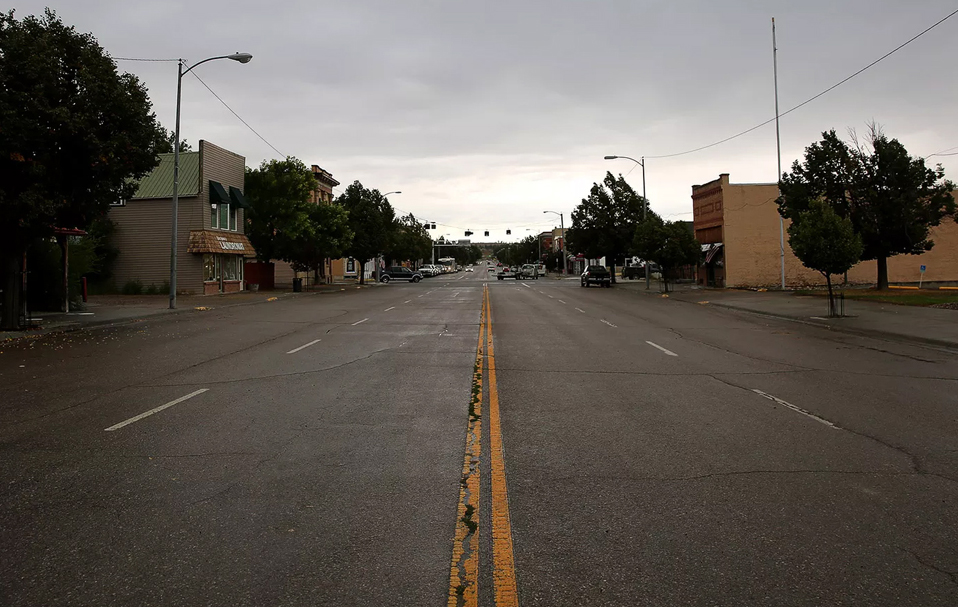
Main street Roundup
At that time there were about fifteen. Mostly in Oregon, New Hampshire and Delaware, where there are no sales taxes. So sellers who want to display products on Amazon can simply provide this address when buying items from other stores and save a few more percent (for the same reason, for buyers from Russia, Pochtoy.com has warehouses in Delaware and Pennsylvania).
Montana also has no sales taxes! Thought Crystal. And although it is far from here to the East or West coast, where most of the clients live, such a preparatory center in the region could appear. On the contrary, it’s closer to part of Amazon’s warehouses! Thirsting for an idea, she decided to open her own. The name chose a simple one - Selltec .
Soon, goods began to arrive from Volmart and targets across the country - bought by sellers located hundreds and thousands of kilometers away, even from Brazil and the Philippines. Crystal expanded to its garage, then to an abandoned Ford dealership. Then - to the warehouse, which was previously used for pouring concrete into the wells for fracking. She hired ten, then twenty employees. But the flow of goods soon turned into a huge river. A special problem was the old books, with all their finicky stickers that needed to be removed. And every day several hundred of them arrived.

Outside Selltec Center
Crystal worked 15 hours a day, but customers began to complain about the overly slow processing of orders. She had to connect friends and family to somehow deal with this frantic influx of packages. Once in 2016, Crystal invited a friend, Linda McAfee, whose grandson met with her daughter. The couple broke up, not on the best conditions, Crystal talked about this with her friend, and they also had a quarrel. Now Linda says she herself left work. Crystal says she fired her.
Anyway, in the end, Linda decided to start the same business on her own. At 59 years old. Things also quickly went up; she had to rent a building at the entrances to the city. And then - also hire a few women to help with the packaging. From here, Amazon's product preparation business began to spread throughout the Roundup at the speed of rumors. Friends, neighbors, neighbors of neighbors connected to it ...
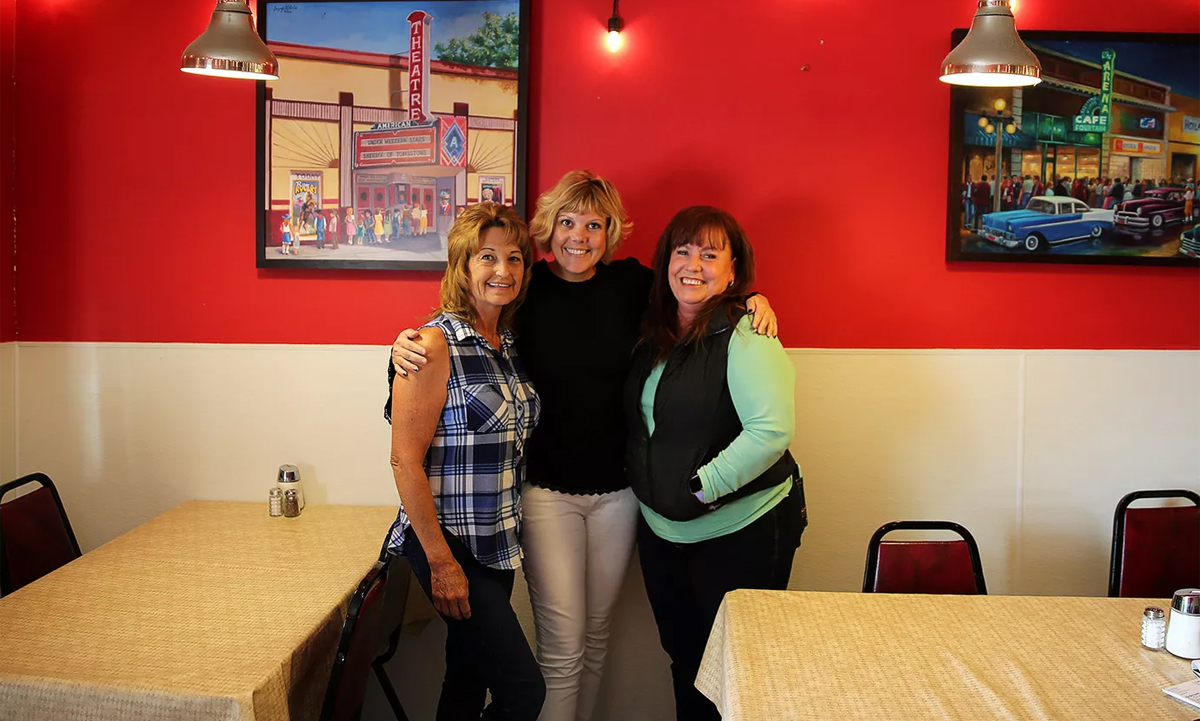
Linda McAfee, Sandy Green and Jill Johnson
The peculiarity was that, unlike many people who gnawed a niche with their teeth in a highly competitive Amazon environment, women from the “pre-centers” treated newcomers very well, and even encouraged them. Amazon sellers will do just about anything, build the trickiest scheme to undermine their rival socks business for five dollars. But there are more than enough clients for the “preparers”, their main problem is the failure to meet deadlines. So they are even happy to give some of the requests to some newcomer.
One of the women, Chris Reger, learning about such a case, created a simple website and arranged an operation for the preparation of parcels in the side room of her store. Now it processes daily packages from Walmart, Target, REI and Big Lots that go to Amazon. And, as he says, he earns many times more than the people who daily humped in the mine.
There are nine women in the group chat room of the “preparers.” They ask for tips and share tips on how best to pack products for Amazon, and which customers to watch out for. A few more girls work for them in apprenticeships. Many also work independently, or create their own groups. In total, Roundup now receives three to four thousand parcels every day for processing. This is about twice the total number of people who live here.

Inside one of the training centers
Over the year, the town receives and repackages more than a million goods. Basically, they come from resellers who have found what is not yet on Amazon, or who have taken their products to higher positions due to competent promotion and quality reviews. In recent years, sellers have even created software that can parse information from stores and find products that can be sold for profit. One of the most popular is Tactical Arbitrage , which automates most of the process. It was developed in 2015 by an Australian reality show producer who began selling on Amazon so he had something to do in between seasons.
The whole process for some turns into almost stock trading, only at a more everyday level. I bought it cheaply, sold it more expensive, all from the comfort of my own chair. And if you did not succeed in guessing, the product will still gradually be sold, albeit with less profit.
The missing link previously was only training centers. Someone must accept all of these shipments, make sure the quality of the goods, and repack them in accordance with Amazon standards. Now, a salesman in Ontario, Manila or Lublin can buy hundreds of toasters from the Target warehouse in San Bernandino, and start trading them on the world's largest online site, collecting profit. It is enough to send to the Roundup, which will send them to Amazon, and that will automatically distribute them to its many centers - depending on the projected demand in each region. From gigantic Amazon centers, toasters will come to small warehouses, and then, finally, to customers.
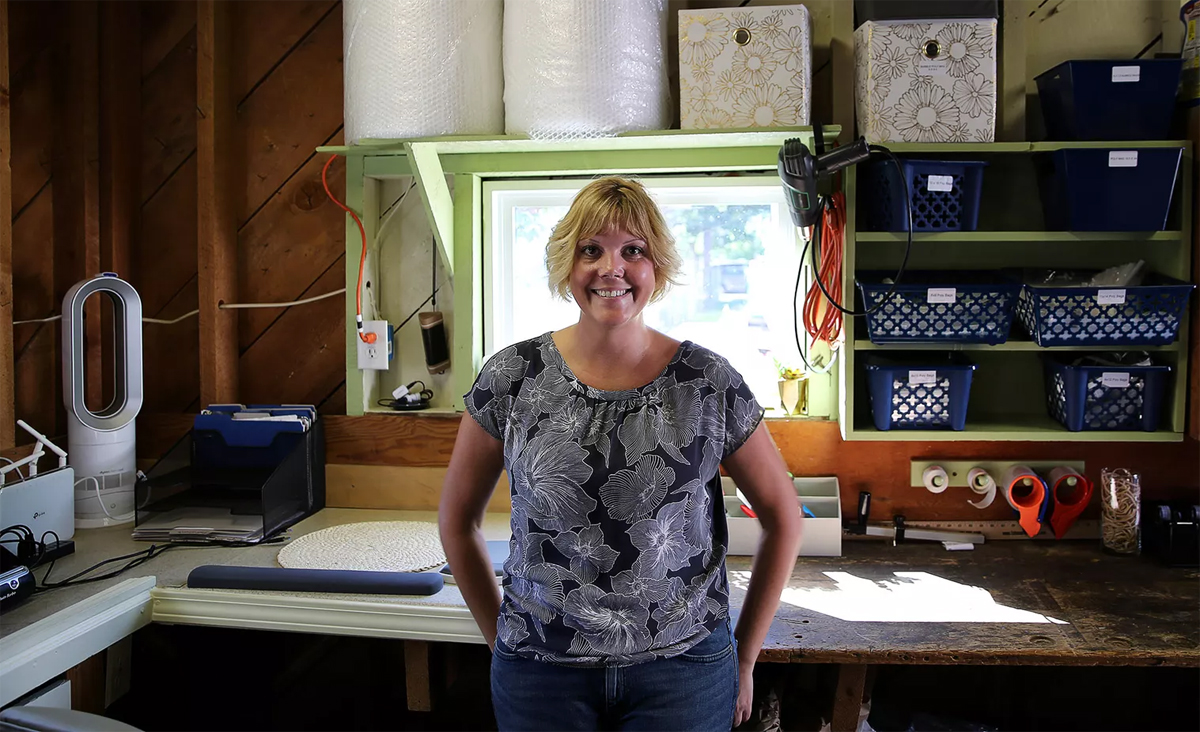
Sandy Green at his workplace
The women from Roundup are rather puzzled by their role in this system. Most of them could never imagine that you can make money on this. Many of them used to work on farms, caring for livestock, or did not work at all.
Now - each package prepared and sent brings them up to one dollar. If the goods are small and women work quickly, you can get decent money. Sandy Green, who writes all of her work to a notebook, says she earned $ 49.55 an hour yesterday by packing 353 miniature toys. Revenue drops sharply if you have to cook something big for Amazon, say, strollers or televisions. But this is still unheard of earnings for Montana, and working hours are very flexible.
Linda tells:
In our town you can find a job except at the minimum rate. It turns out many times more. And it, in fact, costs nothing to start such an operation. When I started, I only had a computer and a printer.
Clients invited the “packers” to stay with them in Greece and Slovenia. Linda works with sellers from Australia, Canada and Malaysia. A client from Philadelphia recently even flew to her in Roundup to track the work. Three years ago, in a dream, a woman could not imagine that at 60 she would have her own successful business, and even communications far beyond the borders of her native town.
PS You can earn on Amazon not only in the USA. Even if you are from Russia, you can sell goods to Americans. We call such a service - fulfillment . Pochtoy.com receives, stores, packs and arranges the delivery of your goods to customers in the United States. We work with all platforms, including eBay, Walmart, Target and Etsy. You can trade in the largest market in the world, even if you live very far.
We also deliver parcels to Russia from the USA. Especially now you can save on Apple technology, if you take on Amazon .
